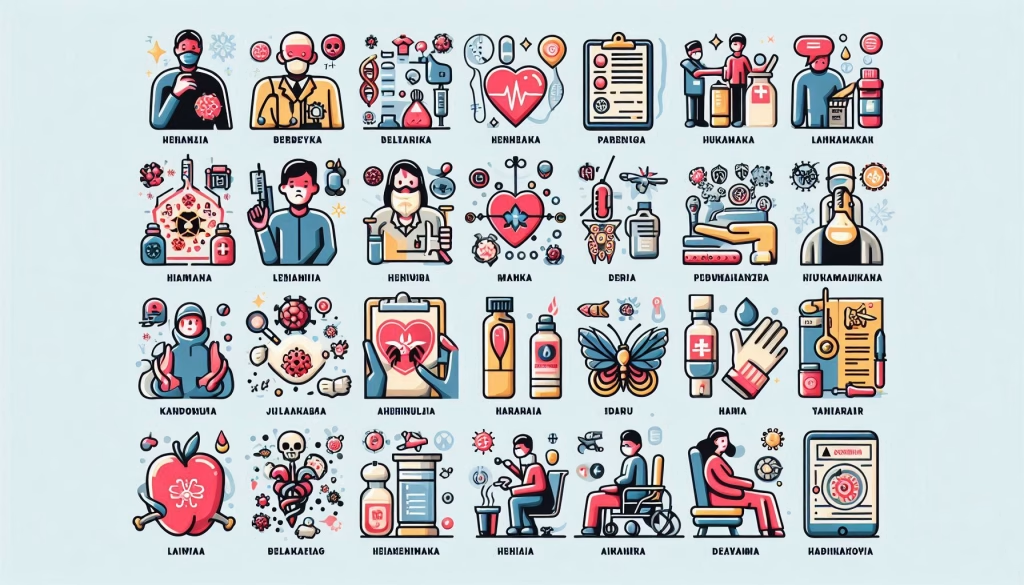Table of Contents
Overview
Health insurance is a type of insurance coverage that offers protection against diverse health risksRisk Risk is a loss that occurs to the insured individual or object. Various bad possibilities could happen to someone.. Its utilization is notably high, surpassing that of other insurance products.
When you enroll in a health insurance plan, many health-related risks are transferred to the insurance company. However, it’s important to note that not all conditions or diseases are covered by insurance policies.
List of Diseases Not Covered by Health Insurance

Not all diseases are covered by insurance companies, which is a significant consideration when selecting health insurance. Insurance agents often do not provide detailed explanations, necessitating further inquiries. Additionally, insurance company policiesPolicy The policy is a binding agreement and is agreed upon by the insurance company and policyholder in writing. An agreement made by the policyholder with an insurance company. vary, resulting in different lists of diseases that are not covered.
The following are some of the diseases that are not covered by health insurance:
Diseases Not Covered by Health Insurance No.1
InsuranceWhat.com
Congenital Diseases
This is the first disease that will not be covered by health insurance. Congenital diseases are conditions that the insuredInsured A person who is legally listed in the insurance policy to receive benefits from the policy. A person whose life/health is covered in accordance with an insurance agreement or contract. suffer from due to hereditary factors, including long-standing abnormalities or bodily defects present since birth. Many diseases fall under the category of congenital diseases, such as hernia, asthma, among others.
Diseases Not Covered by Health Insurance No.2
InsuranceWhat.com
Rare Diseases
Rare diseases are conditions that affect a small percentage of the population. They are often complex, with many requiring specialized care and treatment. Despite their individual rarity, collectively, they impact a significant number of people worldwide.
Rare diseases, which include conditions like genetic disorders affecting brain development and various muscle disorders, are often not covered by insurance companies.
Diseases Not Covered by Health Insurance No.3
InsuranceWhat.com
Critical Illness
Critical illness is among the various conditions that are often not covered by health insurance companies. These diseases are typically life-threatening and can incur extremely high treatment costs.

Many critical illnesses, such as diabetes, cancer, lung disorders, and heart disease, are not typically covered by standard health insurance policies. To obtain protection against these types of critical illnesses, one can opt for critical illness insurance services.
Diseases Not Covered by Health Insurance No.4
InsuranceWhat.com
Early-Stage Critical Illness
Early-stage critical illness refers to the initial phase of a serious health condition which may not yet be life-threatening but requires prompt attention to prevent further deterioration.
In addition to insurance products tailored for critical illnesses, there are health insurance plans that cover various types of critical illnesses. Generally, this coverage is provided only for critical illnesses that have reached the terminal stage.
Critical illnesses in their early stages may not be covered by health insurance. It’s crucial to thoroughly understand these provisions from the outset to avoid complications when making a claimClaim The demands are given by the insurance policyholder to get the right properly so that the insurer pays the conditions according to the existing procedure. later on.
Diseases Not Covered by Health Insurance No.5
InsuranceWhat.com
Psychological Illness
Psychological illness refers to a range of mental health conditions that affect mood, thinking, and behaviour. These disorders can create significant distress and impact various areas of life, including personal and social functioning. Common types of psychological illnesses include anxiety disorders, mood disorders, schizophrenia, eating disorders, and addictive behaviours. It’s important to seek professional help for diagnosis and treatment of any mental health concerns.

Similar to critical illnesses, some health insurance policiesInsurance policy An agreement between the policyholder and the insurance company to perform the obligations as agreed by both parties. do not cover psychological disorders. If you require coverage for these conditions, ensure that your health insurance plan provides it.
Diseases Not Covered by Health Insurance No.6
InsuranceWhat.com
Diseases Resulting from the Plague
Many diseases resulting from plagues are not included in health insurance coverage. Such diseases are deemed highly contagious and have the potential to infect millions of individuals rapidly within a specific region.
For instance, diseases such as bird flu, polio, cholera, and Ebola are caused by outbreaks. Similarly, Covid-19 is a disease resulting from an outbreak. Recently, a number of insurance companies have started offering coverage for Covid-19.
Diseases Not Covered by Health Insurance No.7
InsuranceWhat.com
Common Pre-Existing Medical Conditions Prior to Insurance Application
Insurance companies do not cover pre-existing illnesses of customers at the time of their enrollment. This is why they often require prospective clients to undergo a health check before signing up for insurance coverage.

If an individual has a pre-existing condition prior to enrollment, that condition may not be covered by health insurance.
Diseases Not Covered by Health Insurance No.8
InsuranceWhat.com
HIV/AIDS
HIV/AIDS is also listed among the diseases not covered by health insurance. The frail condition of HIV/AIDS patients is one of the reasons for this exclusion, as these patients are deemed to be at high riskRisk Risk is a loss that occurs to the insured individual or object. Various bad possibilities could happen to someone. of illness.
Diseases Not Covered by Health Insurance No.9
InsuranceWhat.com
Pregnancy Screening and Care
Pregnancy care, including early check-ups, initial miscarriage management, emergency services for pregnancy-related complaints, and childbirth expenses, is typically not covered by health insurance policies.
Additionally, insurance companies often exclude coverage for postnatal childcare, immunizations, and postnatal maternal and infant care.
Diseases Not Covered by Health Insurance No.10
InsuranceWhat.com
Excluded Diseases
Diseases that are listed as exclusions will not be covered by the insurance company. The insurance policyInsurance policy An agreement between the policyholder and the insurance company to perform the obligations as agreed by both parties. typically outlines these excluded conditions in the exclusion clauseClause The articles contained in the policy agreement that policyholders and insurance companies must comply with., allowing for thorough review from the outset.
Several conditions are considered exceptions, such as: routine dental check-ups not related to diseases, organ transplants, alternative medicine practices, dialysis, among others.
The Conclusion
Understanding the Types of Diseases Not Covered by Health Insurance
If you are planning to purchase a health insurance policy soon, it’s crucial not to overlook details about the various diseases that are not included in the coverage. Carefully review the insurance policy to avoid future issues and financial losses due to diseases that are not covered by the health insurance.
For maximum insurance protection and broader disease coverage, consider adding a riderRider (Additional Benefit) Additional products from insurance to increase coverage of the main benefit or additional insurance protection at a lower cost. to your policyPolicy The policy is a binding agreement and is agreed upon by the insurance company and policyholder in writing. An agreement made by the policyholder with an insurance company..
Adding a rider to an insurance policy typically results in an increase in the overall premiumPremium The money that must be paid at a certain time is the obligation of the insurance policyholder. The amount of premium paid is determined by the policy and approval of the insurance company in accordance with the conditions of the insured. The nominal payment approved by policyholders and insurance companies. Premium payment will be made according to the agreement, it can be monthly, yearly, or according to the agreement.. It is crucial to thoroughly understand these details from the outset to prevent any potential issues or misunderstandings.
Do you think you have other ideas about Health Insurance Gaps: 10 Diseases You Need to Know About? You can comment and share your thoughts below, or discuss more in the InsuranceWhat Forum. Also, read more articles about GLOBAL INSURANCE or other interesting insurance topic articles only at InsuranceWhat.com.





